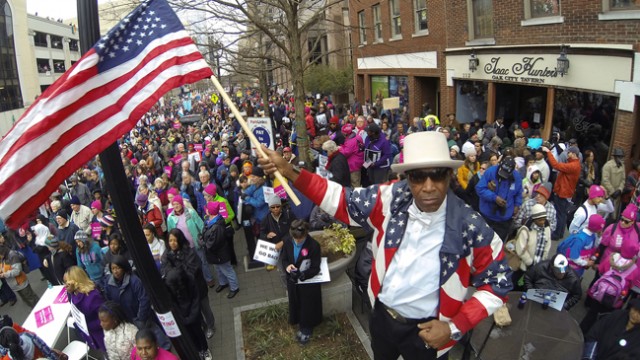This post first appeared at AlterNet.

It was a proud day for this Raleigh native. On Saturday, a crowd of riled-up citizens that the North Carolina NAACP estimated to number upwards of 80,000 — the largest such gathering in the South since the 1965 Selma to Montgomery march — headed to the state capitol to protest the extremist policies of North Carolina’s GOP-controlled legislature.
Black and white, young and old, gay and straight, the people gave voice to a full roster of outrages, from racist attacks on voting rights to the state government’s refusal to expand Medicaid to half a million vulnerable Tar Heels to limitations on women’s reproductive freedom. From a 4-year-old girl carrying a sign that read “Nope to Pope!” (referring to Art Pope, the state’s multimillionaire budget director and Koch ally) to the indomitable Rosa Nell Eaton, a 92-year-old veteran of the Civil Rights movement, they were united with one message: “Forward together, not one step back.”
The Moral March on Raleigh, organized by the North Carolina NAACP, was the eighth annual march of what is known as the Historic Thousands on Jones Street People’s Coalition (HKonJ), and a continuation of the Moral Monday demonstrations that took place in 2013, in which nearly 1,000 people (including my 81-year-old mother, a retired educator) were arrested.
There will be much chatter in the progressive media about this event (though there appears to be disappointingly little in the national press), some of it from people who have limited experience with the South in general, or North Carolina in particular. Since the region’s peculiar contradictions — and triumphs — were on full display Saturday, let me share a bit of perspective from one who grew up in these parts.
Dixie’s Last Stand
I started my Saturday morning at Big Ed’s restaurant, a downtown favorite for Southern cooking, where you can enjoy delicacies like pork brains with eggs and fatback biscuits in a big open dining room decorated with agricultural paraphernalia. The crowd is mixed race, more white than black. Tucked over in one corner is a Civil War shrine, complete with battle scenes and what appears to be North Carolina’s Confederate battle flag. Two tables of black customers enjoy their breakfast surrounded by this display.
Someone from another part of the country might be aghast at this scene. But if you’re going to begin to understand it, and how it relates to the Moral Monday movement, you’ve got to know certain things.
You’ve got to know that North Carolina is a state in which a great part of the population never really accepted the planter class. Despite the clichéd nod to something called “Dixie” in the corner of Big Ed’s, Tar Heels were never very enthusiastic about the Civil War while it raged. When it ended, the state gave the South its most powerful display of fusion politics in the mid-1890s, when a ticket of populists and Republicans, with key support from black leaders, won the legislature and elected not only the governor, but both US senators.
That extraordinary triumph is what drove conservative Democrats to build a coalition of planters and industrialists to crush the insurgency with a mix of horrific violence and racism in the election of 1898. The state’s elites managed to push down the fusion coalition and disenfranchised nearly all blacks and most poor whites. The battle lines were drawn, and these dynamics continued to play out throughout the 20th century.
That history reverberates through North Carolina right now; the memory of blacks and whites who came together to challenge the elites, and the shocking brutality of the response. When North Carolina swung for Barack Obama in 2008, the Old Guard was reawakened, and it has been trying to suppress voting rights, attack minorities and women and resegregate the schools ever since. Anything to protect its turf.
You might conclude from that little display at Big Ed’s that the Old Guard has the upper hand. But if you look more closely, you might sense that the relaxed presence of African American diners (being served, incidentally, by white waiters), is something that makes the images of the Civil War generals on the wall look pale and powerless. The feeble displays of Dixie are dismissed as background noise, while just a few blocks away, an energetic, lively New Fusion crowd gathers to let those mostly white old men who are putting on Dixie’s Last Stand in the state legislature know that they are correct to be afraid, because they are a dying breed that has no place in the state.
The God of Big Things
After finishing my biscuit and grits, I head down to South Street. Marchers are gathered before a stage where speakers offer encouragement and prayers. You can hear many shouts of “Amen!” as protesters prepare to make their way to the capitol, and though I am not religious, I shout too.
You might notice, if you were experiencing it for the first time, that the Moral Monday movement is highly spiritual. In contrast to the Occupy movement, talk of God is constantly in the air. But the spirit summoned is one of tolerance and love rather than bigotry and hate.
The leader of the Moral Monday movement, the charismatic Rev. William Barber, is an African American minister whose voice carries the cadences of Martin Luther King Jr. and the great orators of the black church. The god he speaks of at the Moral Monday march is not the god of Billy Graham or the Tea Party, but the god of social justice, who is well-known in these parts. “We are people of all faiths,” says the Rev. Barber, “and people not of faith but who believe in a moral universe.” Barber is a man who sees in the Bible a document that demands aid to the poor and defense of the vulnerable. He likes to quote Isaiah 10, which says, “Woe unto those who make unjust laws that rob the right of the poor.”
Rev. Barber is not alone among Tar Heel pastors seeking social justice. The co-host for the Feb. 8 march is the Rev. Nancy Petty, the pastor of Pullen Memorial Baptist Church. When my New York friends hear that I attended a Baptist church growing up, they nod sympathetically, waiting for me to tell them how awful it was. When I tell them about Rev. Petty, Pullen’s pastor, the first openly gay Baptist minister in the South, their eyes bulge.
To understand Pullen Memorial, you’ve got to understand that progressive Christians in North Carolina follow a social gospel tradition of inclusiveness and equality that has run through the state ever since the Quakers put down roots here in the 17th century. You’ve got to know that in 1958, the liberal firebrand W.W. Finlator led Pullen to embrace all races (a shocking move for the time), and that over a tenure stretching into the 1980s, he gave passionate sermons calling for racial equality, women’s rights, gay rights and relief for the poor that echoed throughout the nation. Rev. Petty has emerged as a dynamic, fearless leader in this tradition, and it is only natural that she is here today, calling out for the light to be lifted and for the people in the crowd to dance joyfully on a day of justice.
Not Going Away
When I asked Rev. Barber if the Moral Monday movement was a kind of Southern-fried Occupy — it has, after all, spread to several other Southern states — he agreed that the two had some things in common; namely people who are moved to respond to gross injustices. But he reminded me that his coalition had been pushing for an anti-racism, anti-poverty, anti-war, anti-discrimination agenda even before the Republicans took over North Carolina. The success of his coalition is reflected in the fact that the state had, until recently, the most progressive voting laws in the South, which helped elect Obama.
That is why the Old Guard is so vitriolic. Because it has seen the 400-year-old populist tradition in the state reemerging and succeeding. That tradition is unique in the South and has existed since the 1670s, when rebels led by John Culpeper reacted to the proprietary governor’s attempt to enforce the restrictive British Navigation Acts by tossing him in prison and setting up their own legislature, which lasted two years.
It’s not an easy force to put down. “We are here to stay,” Rev. Barber said. “We have not, and will not, give up on getting to higher ground, on building a better North Carolina, a better South and a better America. We are going to move this state forward together, and we refuse to take one step back.”
Rev. Barber has called for the first North Carolina Moral Freedom Summer in 2014 in honor of the historic Mississippi Freedom Summer 50 years ago. His message to extremist lawmakers is clear and undaunted: “You don’t have enough political power to vote us away, enough insults to talk us away, or enough money to buy us away.”
As gospel singers greet marchers who reach the state capitol, I see a woman holding a sign that says, “We are gentle, angry, and determined.” Nothing could better express the spirit of Tar Heel protesters, who can stare extremism in the eye and maintain an air of gentility while they do it.
The 2014 midterm elections are looming large in North Carolina, with attacks on Democratic Sen. Kay Hagan heating up. GOP-designed gerrymandering in the state in 2010 gave Republicans the advantage, and in 2012, the GOP took both the state House and Senate and sent Republican Pat McCrory to the governor’s mansion. The GOP gained control of North Carolina’s government for the first time in more than a century. Rev. Barber has made it clear, however, that the Moral Monday movement is not about Democrats versus Republicans, but about right versus wrong. He is reminding both parties of their moral obligations, and if February 8 is any indication, he is just getting started.


